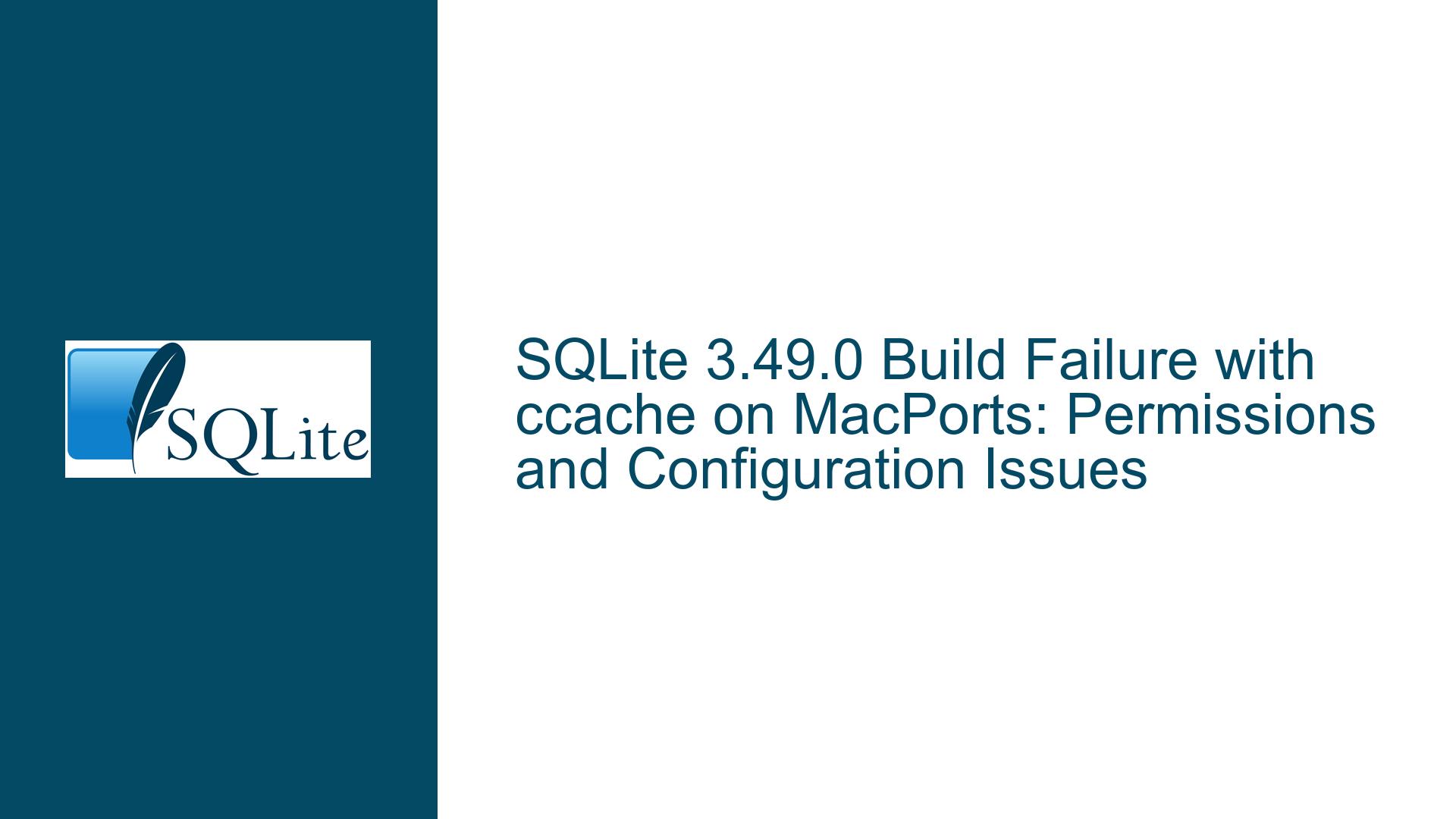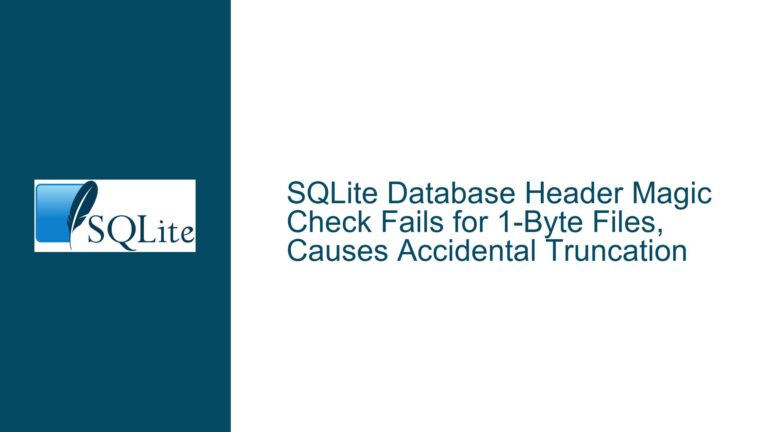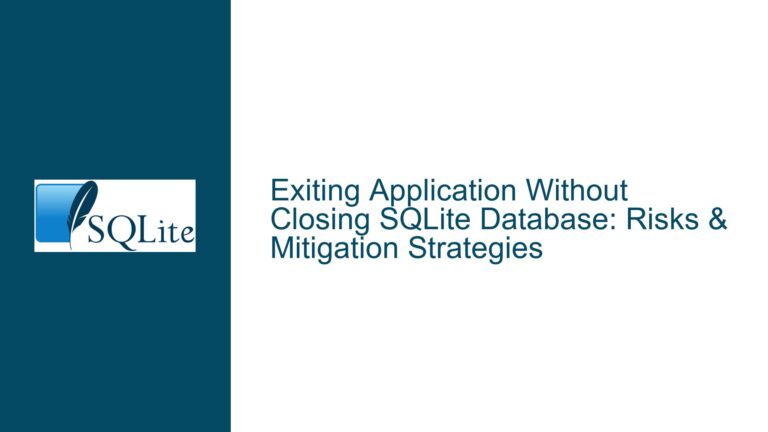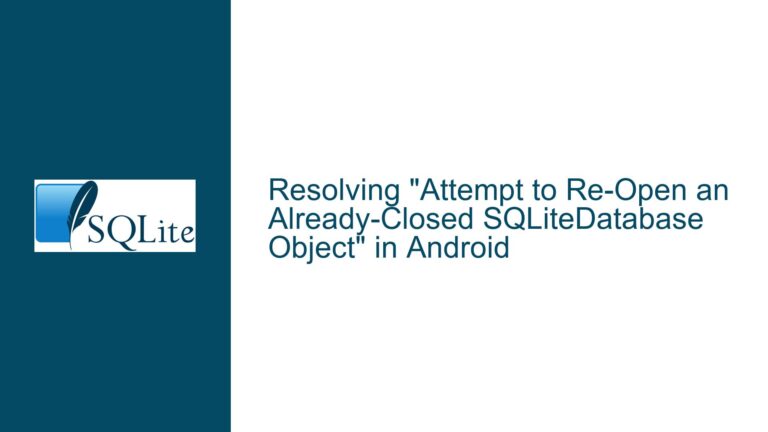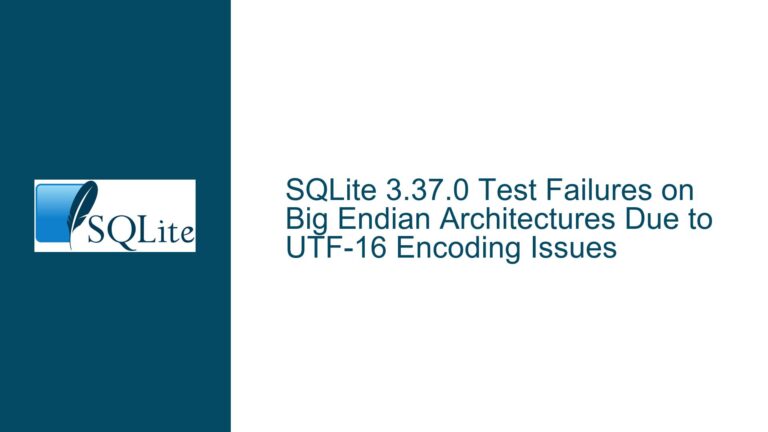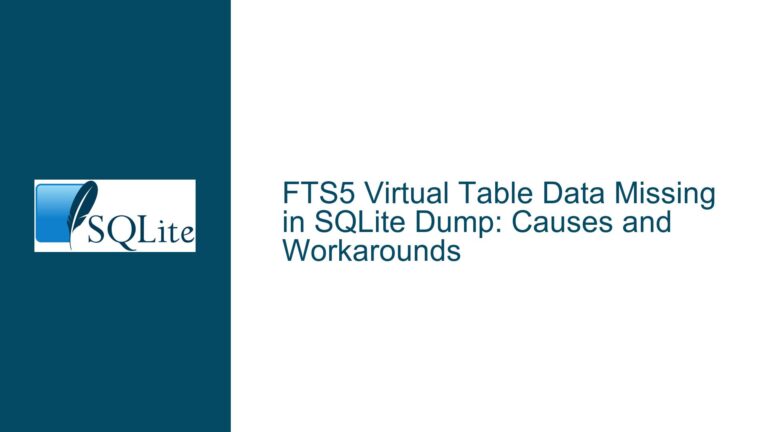SQLite 3.49.0 Build Failure with ccache on MacPorts: Permissions and Configuration Issues
Issue Overview: SQLite 3.49.0 Build Failure with ccache on MacPorts
The core issue revolves around a build failure when attempting to compile SQLite 3.49.0 using ccache on a MacPorts environment. The failure manifests during the configuration and compilation phase, specifically when the ccache wrapper is invoked to compile a simple test program using the Clang compiler. The error message ccache: error: Operation not permitted suggests a permissions-related issue, but the exact cause is not immediately clear. The build process fails even when targeting a single architecture (arm64) or multiple architectures (universal build), indicating that the problem is not inherently tied to the architecture specification.
The build process is initiated with a standard ./configure command, which includes flags to enable various SQLite features such as FTS3, FTS4, FTS5, JSON1, and RTREE, among others. The ccache tool is used to speed up compilation by caching previously compiled object files. However, in this case, ccache appears to be the source of the problem, as disabling it allows the build to proceed without errors.
The error occurs during the compilation of a minimal test program, which is part of the configuration process to verify that the compiler is functioning correctly. The test program is a simple C file that includes a main function returning zero. The failure suggests that ccache is unable to execute the compiler due to some form of restriction, possibly related to file permissions, environment configuration, or an incompatibility between ccache and the specific version of Clang being used.
Possible Causes: Permissions, ccache Configuration, and Compiler Flags
The build failure can be attributed to several potential causes, each of which requires careful examination to isolate the root issue.
1. Permissions Issue with ccache:
The error message ccache: error: Operation not permitted strongly suggests a permissions-related problem. This could occur if ccache does not have the necessary permissions to access certain directories or files required during the compilation process. For example, ccache might be attempting to write to a cache directory that is restricted or owned by another user. Additionally, the ccache binary itself might have incorrect permissions, preventing it from executing certain operations.
2. ccache Configuration:
The configuration of ccache could be another source of the problem. If ccache is not properly configured to work with the Clang compiler, it might fail to execute the compiler correctly. This could be due to an incorrect ccache configuration file, or an environment variable that is interfering with ccache‘s operation. For instance, the CCACHE_DIR environment variable, which specifies the cache directory, might be set to an invalid or inaccessible path.
3. Compiler Flags and Architecture Specification:
The build process includes several compiler flags, such as -arch arm64 and -arch x86_64, which specify the target architectures for the build. While specifying multiple architectures is generally supported by MacPorts for creating universal binaries, there could be an issue with how these flags are interpreted by ccache. It is possible that ccache is not handling the -arch flags correctly, leading to the Operation not permitted error. Additionally, the use of the -isysroot flag to specify the SDK path might be causing issues if ccache is not correctly passing this flag to the underlying compiler.
4. Environment Variables and PATH Configuration:
The build environment might contain environment variables that are interfering with ccache or the compiler. For example, the AWK environment variable is automatically added by MacPorts, but it is not used by the SQLite build process. While this does not directly cause the build failure, it highlights the potential for other environment variables to affect the build. Additionally, the PATH environment variable might be misconfigured, causing ccache to invoke an incorrect version of the compiler or other tools.
5. Incompatibility Between ccache and Clang:
There could be an incompatibility between the version of ccache being used and the version of the Clang compiler. This is less likely, but not impossible, especially if either ccache or Clang has been recently updated. In such cases, ccache might not be fully compatible with the new version of Clang, leading to unexpected errors during the build process.
Troubleshooting Steps, Solutions & Fixes: Resolving the ccache Build Failure
To resolve the build failure, a systematic approach is required to identify and address the root cause. The following steps outline a comprehensive troubleshooting process, including potential solutions and fixes.
1. Verify ccache Permissions:
The first step is to verify that ccache has the necessary permissions to execute and access the required directories. This involves checking the permissions of the ccache binary, as well as the cache directory specified by the CCACHE_DIR environment variable.
Check the permissions of the
ccachebinary by running the following command:ls -l $(which ccache)Ensure that the binary is executable by the current user. If not, adjust the permissions using
chmod:chmod +x $(which ccache)Verify the permissions of the cache directory. By default,
ccacheuses~/.ccacheas the cache directory. Check the permissions of this directory:ls -ld ~/.ccacheEnsure that the directory is writable by the current user. If not, adjust the permissions:
chmod 755 ~/.ccache
2. Disable ccache Temporarily:
To rule out ccache as the source of the problem, disable it temporarily by setting the CCACHE_DISABLE environment variable to 1 or by passing CCACHE=none to the configure script.
Disable
ccacheby setting the environment variable:export CCACHE_DISABLE=1Then, rerun the
configurescript and attempt the build again.Alternatively, disable
ccacheby passingCCACHE=noneto theconfigurescript:./configure --prefix=/opt/local --enable-threadsafe --disable-readline --enable-editline AWK=/usr/bin/awk CCACHE=none
If the build succeeds without ccache, this confirms that the issue is related to ccache configuration or permissions.
3. Reconfigure ccache:
If ccache is determined to be the source of the problem, reconfigure it to ensure it is set up correctly. This involves checking the ccache configuration file and environment variables.
Check the
ccacheconfiguration file, typically located at~/.ccache/ccache.conf. Ensure that the configuration is correct and that the cache directory is set to a valid and accessible path.Verify that the
CCACHE_DIRenvironment variable is set correctly. If it is not set,ccachewill use the default cache directory (~/.ccache). To explicitly set the cache directory, use:export CCACHE_DIR=/path/to/cache/directoryEnsure that
ccacheis correctly linked to the Clang compiler. You can check this by running:ccache --versionThe output should indicate that
ccacheis configured to use the correct compiler.
4. Check Compiler Flags and Architecture Specification:
The build process includes several compiler flags, such as -arch arm64 and -arch x86_64, which specify the target architectures. Ensure that these flags are correctly handled by ccache.
Verify that
ccacheis correctly passing the-archflags to the compiler. You can do this by runningccachein verbose mode:ccache -v /usr/bin/clang -c -g0 -pipe -Os -isysroot/Library/Developer/CommandLineTools/SDKs/MacOSX14.sdk -arch arm64 -DSQLITE_DISABLE_INTRINSIC -DSQLITE_ENABLE_COLUMN_METADATA -DSQLITE_ENABLE_FTS3_PARENTHESIS -DSQLITE_ENABLE_FTS4 -DSQLITE_ENABLE_FTS5 -DSQLITE_ENABLE_JSON1 -DSQLITE_ENABLE_RTREE -DSQLITE_SECURE_DELETE -DSQLITE_ENABLE_STAT4 -DSQLITE_ENABLE_UNLOCK_NOTIFY -DSQLITE_SOUNDEX -I/opt/local/var/macports/build/_Users_marius_Development_MacPorts_ports_databases_sqlite3/sqlite3/work/sqlite-autoconf-3490000 -I/opt/local/include -isysroot/Library/Developer/CommandLineTools/SDKs/MacOSX14.sdk conftest__.c -o conftest__.oThe verbose output will show how
ccacheis handling the compiler flags. Look for any discrepancies or errors in the output.If the
-archflags are causing issues, try building for a single architecture first to isolate the problem. For example, build forarm64only:./configure --prefix=/opt/local --enable-threadsafe --disable-readline --enable-editline AWK=/usr/bin/awk CCACHE=none --host=arm64-apple-darwin
5. Update ccache and Clang:
If the issue persists, consider updating ccache and the Clang compiler to the latest versions. This can resolve any incompatibilities between the tools.
Update
ccacheusing the package manager:brew update && brew upgrade ccacheUpdate the Clang compiler by updating Xcode Command Line Tools:
xcode-select --install
6. Clean the Build Environment:
Sometimes, residual files from previous builds can cause issues. Clean the build environment to ensure a fresh start.
Clean the SQLite source directory by running:
make distcleanRemove the
ccachecache directory to ensure a clean cache:rm -rf ~/.ccache
7. Reattempt the Build:
After performing the above steps, reattempt the build with ccache enabled. If the build succeeds, the issue has been resolved. If not, further investigation may be required, such as examining the config.log file for additional clues or consulting the ccache and Clang documentation for more advanced troubleshooting.
By following these steps, you should be able to identify and resolve the build failure related to ccache and successfully compile SQLite 3.49.0 on MacPorts.
